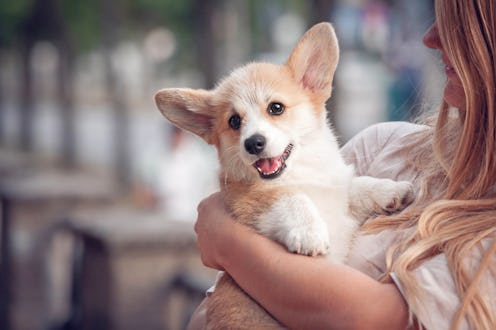Life
3 Behaviors That Most Puppies Grow Out Of Over Time

Do you melt into a giant puddle of goo at the sight of a puppy? Same. But how do you feel once that puppies chews up the couch cushion and then pees in your shoe? Probably mildly perturbed. Pups are tricky creatures, and their owners can get worked up with these less than desirable behaviors, not really understanding that there are things puppies do that they'll grow out of as a dog.
To be clear, you still need to train your doggo. Certain behaviors will ease up over time, but guidance from the human (that'd be you) is an absolute must. Be sure to reward good behavior and correct the negative stuff — like how your pupper likes to eat all your most expensive underwire bras. That would be bad.
All that being said, if your little furball is pushing you to the edge with its naughty behavior, take a breath, have patience, and remember that puppies are curious and sometimes mischievous little creatures. Here are three habits that'll let up as they get older.
1. Nipping And Chewing
It's oodles of fun to play with your puppy — until they're clamping down on your finger with their razor sharp teeth. How does something so cute have such deadly chompers?
Puppies chew for a couple of reasons.
First, it's how they explore, investigate, and understand more about their surroundings. Everything is an adventure. Everything is new. And oftentimes, puppies let their mouths lead them.
Second, just like humans, dogs experience teething. According to the American Kennel Club, teething hits its peak between 12 to 16 weeks of age. Around six months of age, all of the adult teeth should have grown in.
This is why puppy nipping and chewing should calm down at least a little bit as a dog ages.
How You Can Help
Don't leave it up to your pup entirely to kick this habit, though. Help them by teaching them bite inhibition. The ASPCA says bite inhibition is "a dog’s ability to control the force of his mouthing." When a dog nibbles on your hand while you're playing but doesn't actually try to hurt you, it's exhibiting bite inhibition.
While dogs normally learn bite inhibition while they're playing with other puppies, you should also encourage it. If you're playing with your little one and it bites you especially hard, the ASPCA advises that you let out a high-pitched yelp and let your hand go limp. Keep doing this until you puppy catches on that they're causing you pain. They should eventually stop.
2. Separation Anxiety
Separation anxiety is exactly what it sounds like: your puppy gets stressed when you leave them alone. They doesn't merely sit there and worry about when you'll return, though. The puppy's stress might come out as barking, howling, chewing, going to the bathroom where they shouldn't, and even trying to escape their crate — something a dog can actually seriously hurt themselves doing.
While an adult dog is more comfortable spending a little time alone while you're off running errands, a puppy doesn't yet understand that you didn't disappear forever and ever. That's why when you come back, they act as if it's been years since you left.
To begin, your pupper simply needs more time being alone and the opportunity to be crate-trained. Once they start to understand that being left alone isn't necessarily an awful thing (and neither is the crate), the separation anxiety should calm down a bit. The AKC suggests you start early and leave your puppy for short periods of time, slowly increasing the amount of time that you're away.
How You Can Help
There are additional things you can do, too.
You can condition your dog to associate your absence with something positive. For example, leave them a special treat when you leave. You might even hide a few around the house so your pup has to go on a little scavenger hunt.
Check to make sure your puppy has items that they're free to play with and chew on, plus stuff to keep them comfy — like a bed, pillows, and a blanket.
Giving your dog plenty of exercise might also help them settle down when you're not there.
3. Humping And Mounting
"Stop humping the pillow!" "Stop humping your friend!" "Stop humping my leg!" Sound familiar?
Per Cesar Millan, dog trainer and host of the series Dog Whisperer with Cesar Millan, both male and female dogs hump, mount, and even masturbate! Who knew? It can be a sexual behavior, they can be doing it to establish power, they might be playing, or the dog could be responding to stress or excitement.
To an extent, your pup should learn to control the humping in certain scenarios. For instance, they might one day hump a dog who doesn't want to be humped and will make it clearly known. Your puppy may also eventually learn that you don't like when they hump certain things, like your $3,000 leather sectional.
How You Can Help
Your doggo is really going to need your help on this one. Many dogs making humping a habit because they know it feels good. (Amen!)
While it might not stop it completely, spaying or neutering your pet can help.
The ASPCA says this can help reduce the dog's sexual motivation particularly if it's a male dog triggered by a female dog in heat. Plus, spaying or neutering can help prevent certain health problems in your dog.
And as always, reward good behavior. If your puppy is humping your houseguest and stops when you tell them to, be sure to give little Fluffy a part on the head.
While raising and training a puppy is often more challenging than dog owners expect it to be, there is light at the end of the tunnel. Be consistent with your training, practice patience, and watch your pup grow into a well-behaved adult dog.